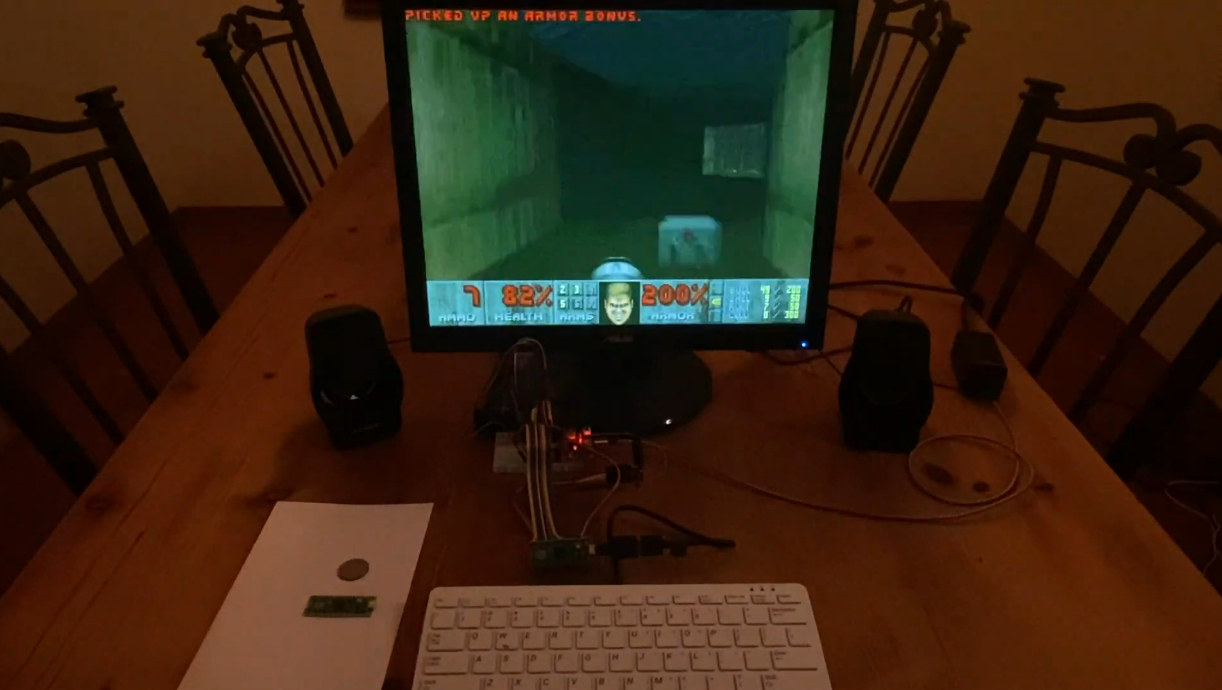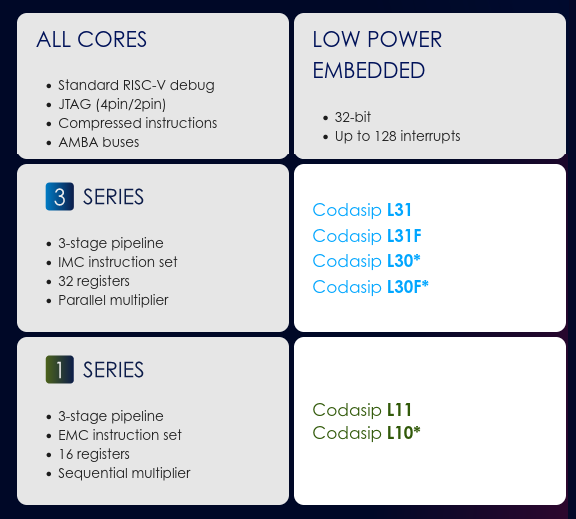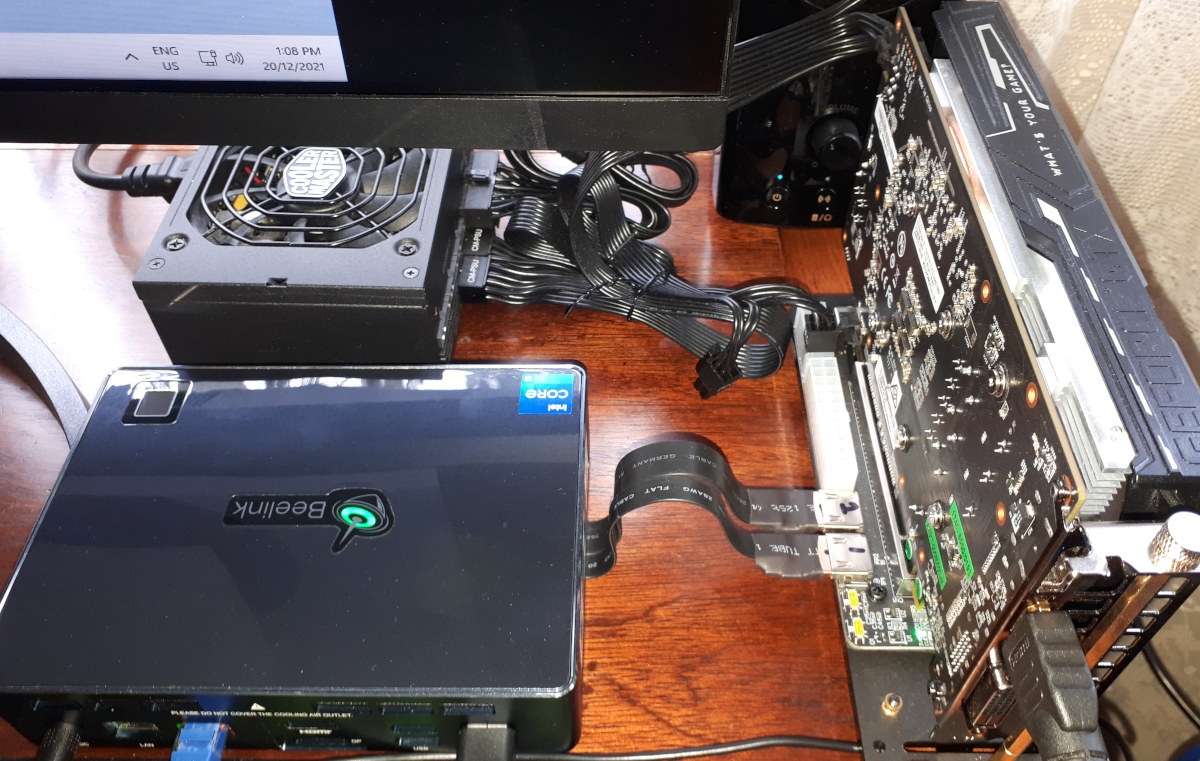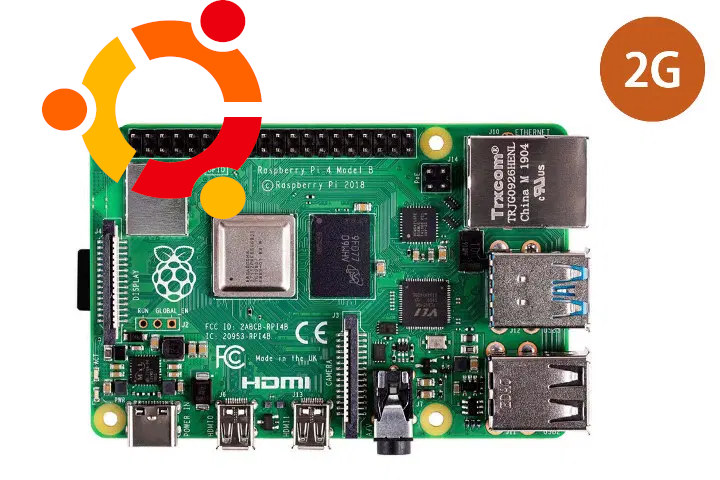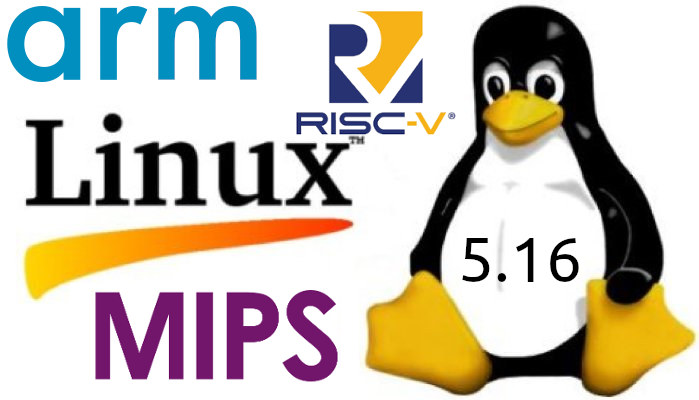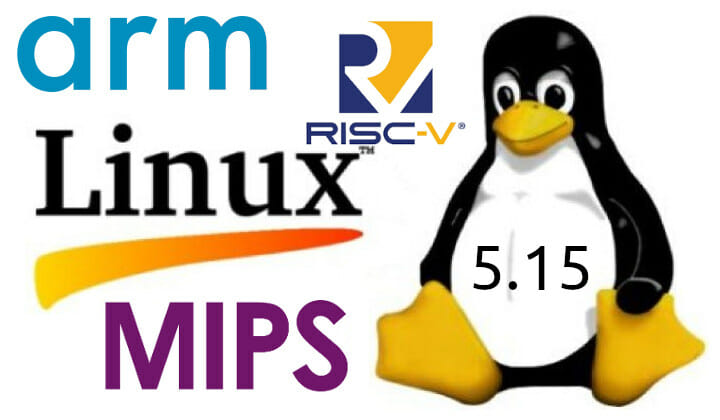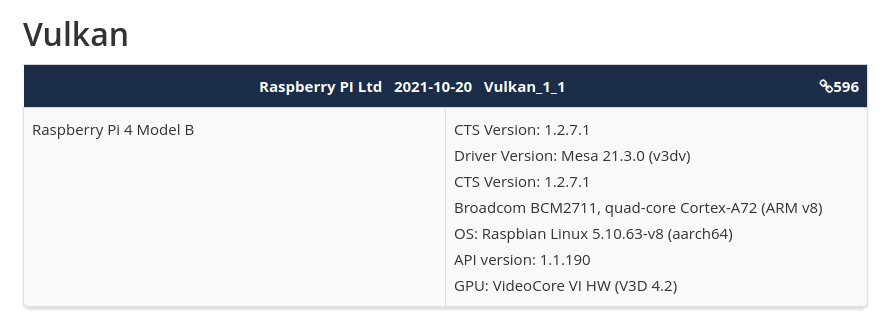Doom has been ported to all sorts of platforms, including ESP32 platforms with 4MB PSRAM but “RP2040 doom” port of Doom to the Raspberry Pi RP2040 is more challenging, since RAM is limited to the measly 264KB built-in into the microcontroller, and for boards with only 2MB flash like the Raspberry Pi Pico, storage capacity becomes an issue. But Graham Sanderson solved all those issues by compressing the data, changing the code to use less RAM, making full use of the two Arm Cortex-M0+ cores, both overclocked at 270 MHz, in order to run Doom (DOOM1.WAD) on Raspberry Pi Pico at 320×240 resolution @ 60 fps, and the full Ultimate Doom and DOOM II WADs expected to fit into Raspberry Pi RP2040 boards with 8MB SPI flash. The port was based on Chocolate Doom, OPL2 emulation for audio support was derived from the emu8950 project, and sound effects were compressed […]
Codasip L31 and L11 RISC-V cores for AI/ML support TFLite Micro, customizations
Codasip has announced the L31 and L11 low-power embedded RISC-V processor cores optimized for customization of AI/ML IoT edge applications with power and size constraints. The company further explains the new L31/L11 RISC-V cores can run Google’s TensorFlow Lite for Microcontrollers (TFLite Micro) and can be optimized for specific applications through Codasip Studio RISC-V design tools. As I understand it, this can be done by the customers themselves thanks to a full architecture license as stated by Codasip CTO, Zdeněk Přikryl: Licensing the CodAL description of a RISC-V core gives Codasip customers a full architecture license enabling both the ISA and microarchitecture to be customized. The new L11/31 cores make it even easier to add features our customers were asking for, such as edge AI, into the smallest, lowest power embedded processor designs. The ability to customize the cores is important for AI and ML applications since the data types, […]
Beelink GTi11 modding – PCIe Gen 4.0 M.2 slot, tweaking power limits, and eGPU
Previously I reviewed Beelink’s new GTi11 Intel Tiger Lake mini PC running Windows 11 and Ubuntu 20.04, so in this final part of the review, I’ll cover in more detail some of the features only briefly highlighted before. Specifically, I’m going to look at the PCIe Gen 4.0 M.2 slot, dabble in ‘overclocking’ and explore eGPU options. Hardware Recap The GTi11 is a 168 x 120 x 39mm (6.61 x 4.72 x 1.54 inches) actively cooled mini PC and the review model has an i5-1135G7 Intel Tiger Lake quad-core 8-thread 2.50 GHz Core processor boosting to 4.20 GHz with Intel’s Xe Graphics. The review model also included a 500GB M.2 2280 NVMe PCIe Gen 3.0 SSD drive with Windows 10 Pro installed, two sticks of 8GB DDR4 3200 MHz memory, a soldered WiFi 6 (or 802.11ax) Intel AX201 chip, and dual 2.5Gb Ethernet ports. Interestingly there are another two key […]
Ubuntu 22.04 LTS to leverage zswap to run on Raspberry Pi 4 with 2GB RAM
Canonical used to recommend Raspberry Pi 4 with at least 4GB RAM to run Ubuntu Desktop, but Ubuntu 22.04 LTS should run more smoothly on the Raspberry Pi 4 2GB as the company has enabled zswap by default to allow the Linux operating system to run better on systems with less memory. Canonical explains that zswap is essentially a compression tool. When a process is about to be moved to the swap file, zswap compresses it and checks whether the new, smaller size still needs to be moved or if it can stay in your RAM. It is much quicker to decompress a ‘zswapped’ page than it is to access the swap file so this is a great way of getting more bang for your buck from systems with smaller amounts of RAM. The good news is that you don’t even need to wait for Ubuntu 22.04 LTS to come […]
Linux 5.16 Release – Main Changes, Arm, RISC-V and MIPS architectures
Linus Torvalds has just announced the release of Linux 5.16: Not a lot here since -rc8, which is not unexpected. We had that extra week due to the holidays, and it’s not like we had lots of last-minute things that needed to be sorted out. So this mainly contains some driver fixes (mainly networking and rdma), a cgroup credential use fix, a few core networking fixes, a couple of last-minute reverts, and some other random noise. The appended shortlog is so small that you might as well scroll through it. This obviously means that the merge window for 5.17 opens tomorrow, and I’m happy to say I already have several pending early pull requests. I wish I had even more, because this merge window is going to be somewhat painful due to unfortunate travel for family reasons. So I’ll be doing most of it on the road on a laptop […]
The Linux kernel could soon be 50 to 80% faster to build
The Linux kernel takes around 5 minutes (without modules) to build on an Intel Core i5 Jasper Lake mini PC with 16 GB RAM and a fast SSD based on our recent review of Beelink GTi 11 mini PC. Kernel developers may have to build for different targets and configurations, plus all modules so the build times may add up. While it is always possible to throw more hardware to quicken the builds, it would be good if significantly faster builts could be achieved with software optimizations. That’s exactly what Ingo Molnar has been working on since late 2020 with his “Fast Kernel Headers” project aiming to eliminate the Linux kernel’s “Dependency Hell”. At the time he aimed for a 20% speedup, but a little over one year later, the results are much more impressive with 50 to 80% faster builds depending on the target platform (x86-64, arm64, etc…) and […]
Linux 5.15 LTS release – Main Changes, Arm, RISC-V and MIPS architectures
Linus Torvalds released Linux 5.15, an LTS version, this past Sunday: It’s been calm, and I have no excuse to add an extra rc, so here we are, with v5.15 pushed out, and the merge window starting tomorrow. Which is going to be a bit inconvenient for me, since I also have some conference travel coming up. But it’s only a couple of days and I’ll have my laptop with me. Sometimes the release timing works out, and sometimes it doesn’t.. Anyway, the last week of 5.15 was mainly networking and gpu fixes, with some random sprinkling of other things (a few btrfs reverts, some kvm updates, minor other fixes here and there – a few architecture fixes, couple of tracing, small driver fixes etc). Full shortlog appended. This release may have started out with some -Werror pain, but it calmed down fairly quickly and on the whole 5.15 was […]
Raspberry Pi 4 achieves Vulkan 1.1 conformance, gets up to 60% GPU performance boost
Khronos has just granted Vulkan 1.1 conformance to Raspberry Pi 4 SBC, and following the implementation of various optimizations and new features such as geometry shaders, the v3dv Mesa driver delivers up to 60% higher GPU performance in Unreal Engine 4. Iglia started Vulkan driver work for Raspberry Pi 4 almost two years ago, with the triangle demo showcased in February 2020, followed by Vulkan 1.0 conformance in November 2020, and now the driver is certified conformant to Vulkan 1.1. While many GPUs are conformant, the Raspberry Pi 4 is only joined by a couple of complete platforms including several NVIDIA Jetson modules (Vulkan 1.2), and possibly some Intel and Google platforms shown as “Confidential” at this time. Alex Bate, Digital Content Manager for the Raspberry Pi Foundation, explains the driver changes for Vulkan 1.1 conformance have already been merged in the upstream v3dv Mesa driver, and should soon become […]


